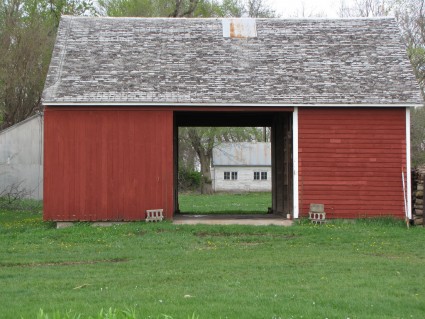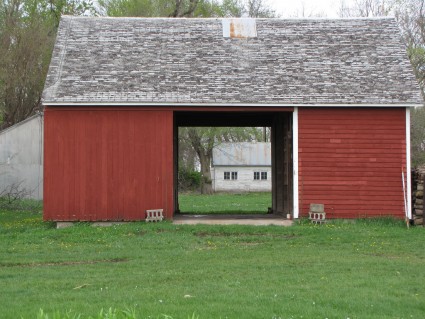 The old granary on our Nebraska property (Steph Larsen)Farmers know that their chosen profession is not an occupation, but a lifestyle. If you believe the Hollywood version, farming is all about waking up at sunrise, frolicking with cute lambs and chicks, and driving a tractor through a field of waving golden grain.
The old granary on our Nebraska property (Steph Larsen)Farmers know that their chosen profession is not an occupation, but a lifestyle. If you believe the Hollywood version, farming is all about waking up at sunrise, frolicking with cute lambs and chicks, and driving a tractor through a field of waving golden grain.
And when the credits roll on that movie, you go back to your day job with its sick days and paid vacations. But real farming doesn’t have those kinds of perks.
For real farmers, there are certain times of year where you best not plan to be away, which is why a lot of farming conferences are in the winter. And if you’re in dairy? Unless you decide to let your cows dry off in winter (which can be a big hit on the bottom line), you’re on the hook twice a day, 365 days a year, unless there’s a relief milker nearby.
While I don’t consider myself a farmer — someone still pays for my time off — this past week, my partner and I were both traveling for work, and we had to find someone to look after the chickens. Luckily we’ve gotten to know our neighbors fairly well: the harsh Nebraska winter meant we were calling each other regularly when the power went out or the snow drifts blocked the roads.
The office where I work is a vast repository of knowledge on all things agricultural, so I asked my colleagues who have livestock what they do when they need to take a vacation. Answers varied. One relies on family, another pays neighbors, and one lamented that she never goes anywhere.
I was glad to hear one of them pays the people they ask to watch over things, because money can be a touchy subject in the Midwest. I think it’s only fair to pay cash if I’m asking our neighbors to take at least an hour out of their day so I don’t have to worry about livestock. But to some folks that sounds like the city girl in me talking, instead of the country neighbor.
The big downside to getting away from a farm is having something go wrong. Case in point: last May, the gentleman from whom we hope to buy our sheep took a short trip to see his niece’s graduation. His ewes decided to have their lambs while his son was caring for them. Normally he’d castrate the ram lambs immediately, but he wasn’t there. Upon his return, he lost track of time and before he knew it, the rams were “mature” — and his ewes were pregnant two months ahead of schedule, including some ewe lambs that were probably too young to be bred.
Being a farmer takes more commitment than most people realize — myself included. I do have an inkling, however, which is why I had to chuckle last week while traveling. I was enjoying a tasty beverage with my friend Andy, who will be managing a university farm with 22 student interns this summer. After introducing herself as a prospective farm intern, a student proceeded to ask whether the three weddings she absolutely has to attend will be a problem, along with numerous 4-day weekends she wants to take.
Granted, these interns are only required to work an average of 12 hours a week. But a real farm couldn’t function if the farmer only worked Monday through Wednesday.
I’ve gotten used to traveling for pleasure, but I don’t want to wear out my neighbors’ willingness to keep an eye on things while we’re gone. I foresee a lot more “stay-cations” in my future, and I don’t mind. If we make our farm the innovative and beautiful place I hope it will be, maybe our loved ones will come to us.



